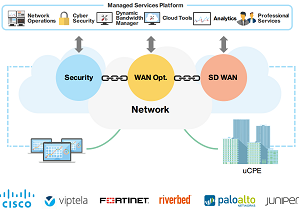News
New Verizon Virtual Network Services Leverage SDN, NFV
It didn't take long for Verizon to follow AT&T into the virtualized network services market, launching its own offering just days after the fellow telecommunications giant introduced a similar service.
Leveraging software-defined networking (SDN) and network functions virtualiztion (NFW) -- just like AT&T's Network Functions on Demand -- Verizon Enterprise Services unveiled Virtual Network Services.
"Available immediately around the globe, the new services will be delivered as-a-service fundamentally transforming the network into software-based solutions running on open platforms -- a significant departure from how network services are provisioned and consumed today," Verizon said in a statement last week. "Driving this change is digitization of business, IP communications, Internet video and mobile to cloud."
Like other SDN/NFV efforts, the new service promises increased agility, performance and efficiency as part of an industry disruption that favors open, interoperable systems and software (often open source) controlling commodity hardware, among many other still-evolving tenets.
While AT&T's offering is designed to be integrated with the company's Virtual Private Networks (VPNs), Verizon said its counterpart as-a-service product is available for public, private and wireless networks from Verizon or other service providers, or in a combination of different providers across separate networks.
 [Click on image for larger view.] Verizon Virtual Network Services (source: Verizon Enterprise Services).
[Click on image for larger view.] Verizon Virtual Network Services (source: Verizon Enterprise Services).
Specifically, Verizon outlined three client models for the virtualized services: premises-based universal customer premises equipment (CPE); cloud-based virtual CPE services (available Fall 2016); and hybrid services where premises-based and cloud-based deployment models can be mixed to meet customized requirements.
The first three Virtual Network Services packages to be available are: Security, WAN Optimization and SD WAN services.
"Virtual Network Services quickly removes the sprawl of single-purpose hardware by virtualizing services, such as WAN routing, security and WAN optimization," Verizon says on its product Web site. "With Virtual Network Services, we can deliver these services in days or less instead of weeks or months. It's all supported by our experts and network functions virtualization (NFV)."
Verizon listed the following business and technical benefits of Virtual Network Services:
-
Agility: Improved time to market through reduced hardware deployment and rapid software provisioning.
- Reduction in total cost of ownership: On-demand, flexible pay-as-you-go pricing model along with reduced hardware requirements.
- End-to-end management: Fully automated and managed orchestration platform to enable Virtual Network Function (VNF) service chains (a range of services deployed simultaneously using the same platform) via a Web portal with point-and-click simplicity.
- Flexible service tiers: Features and functionality consumed as needed.
- Flexibility: Multiple network functions/vendors supported on same platform/universal customer premise equipment.
- Dynamic scaling: Capacity to meet the needs of businesses with hundreds or thousands of locations.
- Rich technology partner ecosystem with world-class vendors: Initial service release includes Cisco, Juniper Networks, Fortinet, Riverbed, Palo Alto Networks and Viptela.
- Rapid and easy service deployment: Use of self-service portals to rapidly enable the order and deployment process.
Besides AT&T and Verizon, other vendors are joining the virtualized network services fray, such as Nuage Networks, which also leverages SDN in its own Virtualized Network Services offering. Even Cisco, the elder statesman of the networking industry that has launched its own SDN-based offerings to stave off disruptive competitors, got in on the act early (at least in name only) when it announced its "new dynamic IT infrastructure" called Network Services Virtualization way back in 2009. Those efforts, however, differ markedly from the recently announced, more modern as-a-service offerings.
"Virtualized services are the way of the future," Verizon quoted IDC analyst Nav Chander as saying. "As a global networking leader, Verizon is out front with its global launch of Virtual Network Services. Their vision, strategy and service deployment are right on point. I expect others in the industry to follow suit."
About the Author
David Ramel is an editor and writer at Converge 360.